

E20 Petrol: Common Myths Busted
- 1India has achieved the target of 20% ethanol blend ahead of schedule with E20 petrol
- 2Ethanol blended petrol has helped India greatly enhance its energy security
- 3There are a lot of myths surrounding E20 petrol that needs to be busted
- What is Ethanol Blending and E20 Petrol?
- Why is E20 petrol a big deal?
- E20 Petrol: The True Story
- Myth: Ethanol is only bad news – there are no real sustainable benefits
- Myth: E20 Petrol damages vehicle engines
- Myth: E20 petrol drastically reduces fuel mileage
- Myth: E20 petrol causes corrosion in fuel systems
- Myth: Consumers are forced to use adulterated petrol
- Myth: Ethanol leads to food shortages
- Myth: Ethanol leads to lower lubrication and more engine wear
- Myth: Ethanol increases knocking in pre-2017 cars
- Myth: The Government does not pass the cost advantage of ethanol blended petrol to consumers
- Myth: E20 is a scam to boost the government fuel tax
- The Bottom Line
With India achieving the 20% ethanol blended petrol target, five years ahead of schedule, E20 petrol is now making way to a majority of fuel pumps across the nation. Almost three years after the adoption of E10 petrol in 2022, E20 fuel marks a new chapter in India’s broader Ethanol Blended Petrol (EBP) Policy, which kicked off in 2003. While ethanol has surely helped India become less dependent on fossil fuels and costly crude oil imports, the public reception of ethanol blended fuel hasn’t been so smooth. With a lot of doubts, myths, and presumptions surrounding E20 petrol, it is high time for a myth-buster to step in, and that’s exactly what we are going to do in this article. So if you are planning to make a shift to ethanol blended E20 petrol, then here’s a myth-busting reality check that can help you make the right choice.
What is Ethanol Blending and E20 Petrol?
The process of blending or mixing ethanol, a renewable biofuel, with petrol to produce a sustainable, cleaner, and less polluting fuel is what we call ethanol blending. In line with global standards, India’s Ethanol Blended Petrol Programme aims at elevating India’s energy security with the large-scale use of ethanol blended petrol. With a 20% blend target achieved in July 2025, way ahead of target, E20 petrol (80% petrol, 20% ethanol) is now widely available across all major fuel stations in India.
Why is E20 petrol a big deal?
The biggest reason that has led several countries to shift to ethanol blended petrol is the flex fuel’s sustainability quotient. Ethanol is a sustainable and renewable biofuel that can be produced by processing biomass sources such as molasses, sugarcane, rice, corn, etc.
Adopting the practice of ethanol blending has greatly reduced India’s dependence on fossil fuels and the high-value import of crude oil, helping save over 1.40 lakh crore in foreign exchange through petrol substitution since 2014-15.
Moreover, the addition of ethanol increases the oxygen content of petrol, resulting in lower tailpipe emissions and cleaner burning. Additionally, since ethanol in India is largely derived from agricultural sources, ethanol blending has also uplifted the agricultural sector in India.
E20 Petrol: The True Story
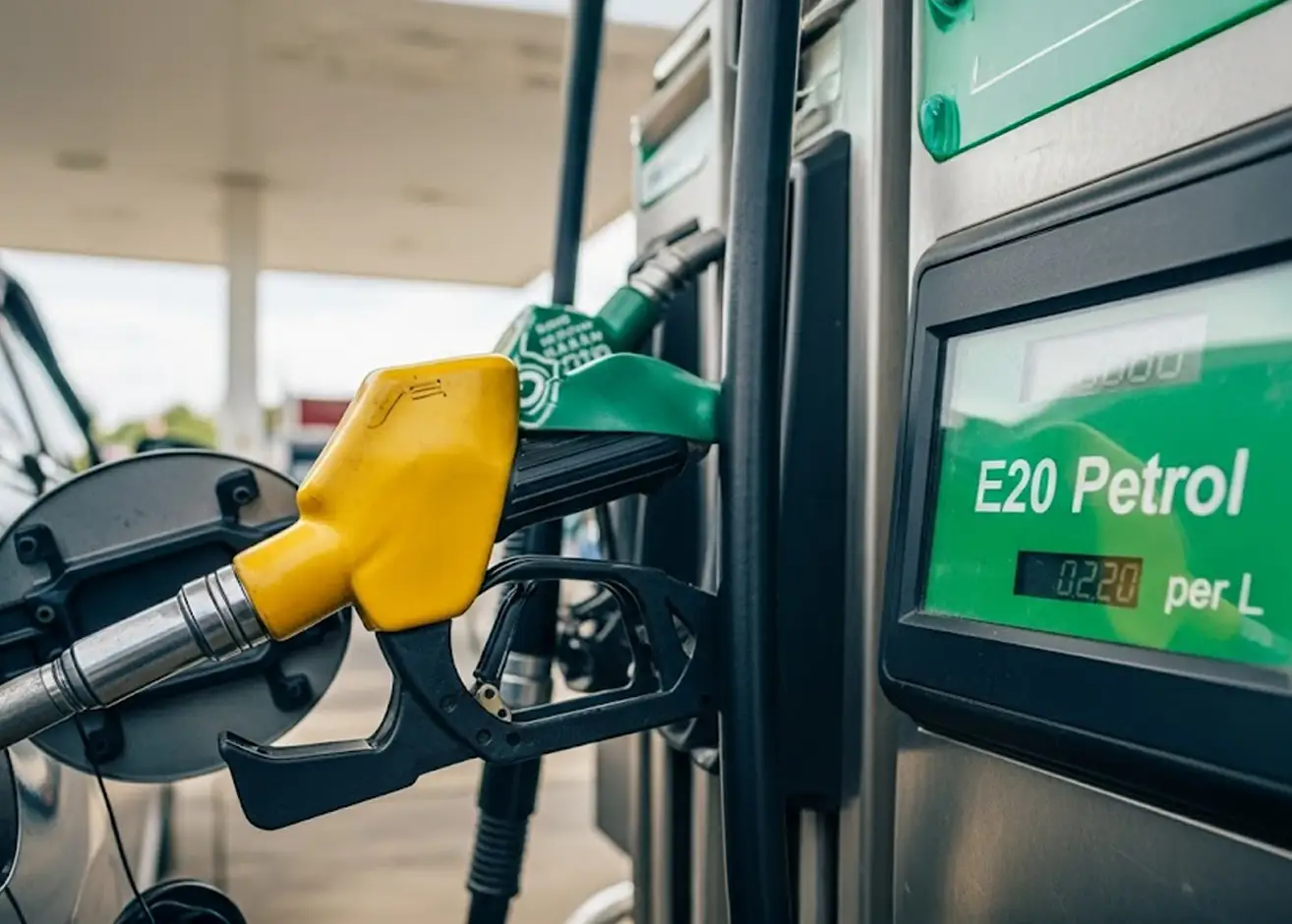
From mileage concerns, engine wear, and environmental issues, to adulteration and flawed implementation, several doubts have time and again surrounded E20 petrol in India. While some doubts often have a well-founded base, a majority are simply myths that are usually responsible for creating a negative mindset. The key to making an informed decision is knowing the true story, and here’s what you need to know about the myths surrounding E20 petrol in India:
| Myth | Reality |
|---|---|
| Ethanol has no real benefits | Reduces CO₂ emissions, fuel imports, and supports farmers. |
| E20 damages older vehicles | Tested up to 1 lakh km with no performance/durability issues; minor rubber/plastic part changes may help. |
| Ethanol drastically reduces mileage | Small drop (~1–2% for E10 engines, ~3–6% for others); can be minimized with engine tuning. |
| Ethanol causes corrosion in fuel systems | Modern fuels have corrosion inhibitors; materials meet BIS/OEM ethanol-tolerant standards. |
| Consumers are forced to use adulterated petrol | E20 is a certified, phased, and regulated fuel—not adulteration. |
| Ethanol causes food shortages | Focus on 2nd-gen ethanol from non-food biomass; food security is maintained. |
| Ethanol reduces lubrication and increases engine wear | E10/E20 blends use lubricity additives; no proven ethanol-linked wear in Indian vehicles. |
| Ethanol increases knocking in pre-2017 cars | Ethanol resists knocking; some older vehicles may need ignition timing/ECU adjustments. |
| The Government does not pass the cost advantage of ethanol blended petrol to consumers | The procurement price of ethanol has increased, leading to an increase in prices |
| E20 is a scam to increase fuel taxes | No evidence of tax hikes; pricing is based on business and policy decisions. |
Myth: Ethanol is only bad news – there are no real sustainable benefits
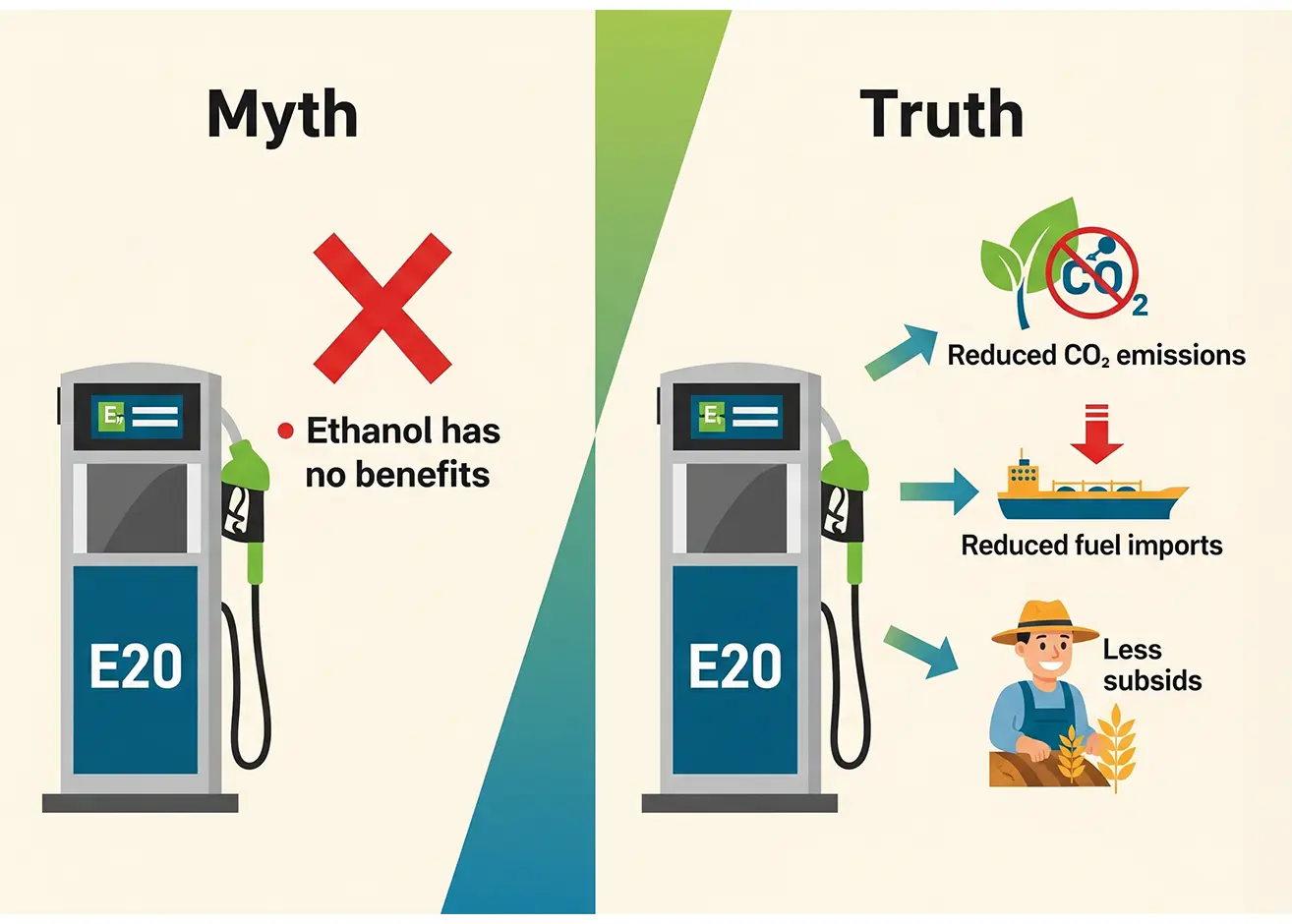
The Reality: Ethanol reduces CO2 emissions, fuel imports, and supports farmers
Remember the renewable vs non-renewable energy debate you read in school? Well, that’s exactly what is going on with ethanol blended vs regular petrol. Ethanol is a renewable energy source that can be produced from organic biomass such as sugarcane, grains, and other agricultural materials. In comparison, petrol is derived from crude oil, which is a fossil fuel and a non-renewable resource that is limited in quantity and takes millions of years to replenish.
So even if you assume that E20 petrol offers no practical advantage as a fuel, the fact that ethanol is a renewable resource alone makes it a sustainable tool that helps India reduce CO₂ emissions, costly crude oil imports, and boosts the agricultural sector responsible for the production of ethanol.
Moreover, a study on life cycle emissions of Ethanol done by NITI Aayog has found that greenhouse gas emissions of sugarcane and maize-based ethanol are less by 65% and 50% respectively, when compared to unblended petrol. Additionally, the production of ethanol has also had a positive impact on the rural economy. It is predicted by the Government that the payment to farmers in 2025 alone would be about Rs. 40,000 crores, thanks to the production of E20 petrol.
Ethanol blending in Petrol by Public Sector Oil Marketing Companies (OMCs) has resulted in several benefits for India since 2014-15 to 2024-2025 (till July 2025): Some of the key benefits include:
- Saving of more than Rs. 1,44,087 crores in foreign exchange
- Cruide oil substitution of about 245 lakh metric tonnes
- Environmental benefits equivalent to planting 30 crore trees
** Figures and data as per the latest press release published by PIB on 12th August, 2025.
Myth: E20 Petrol damages vehicle engines
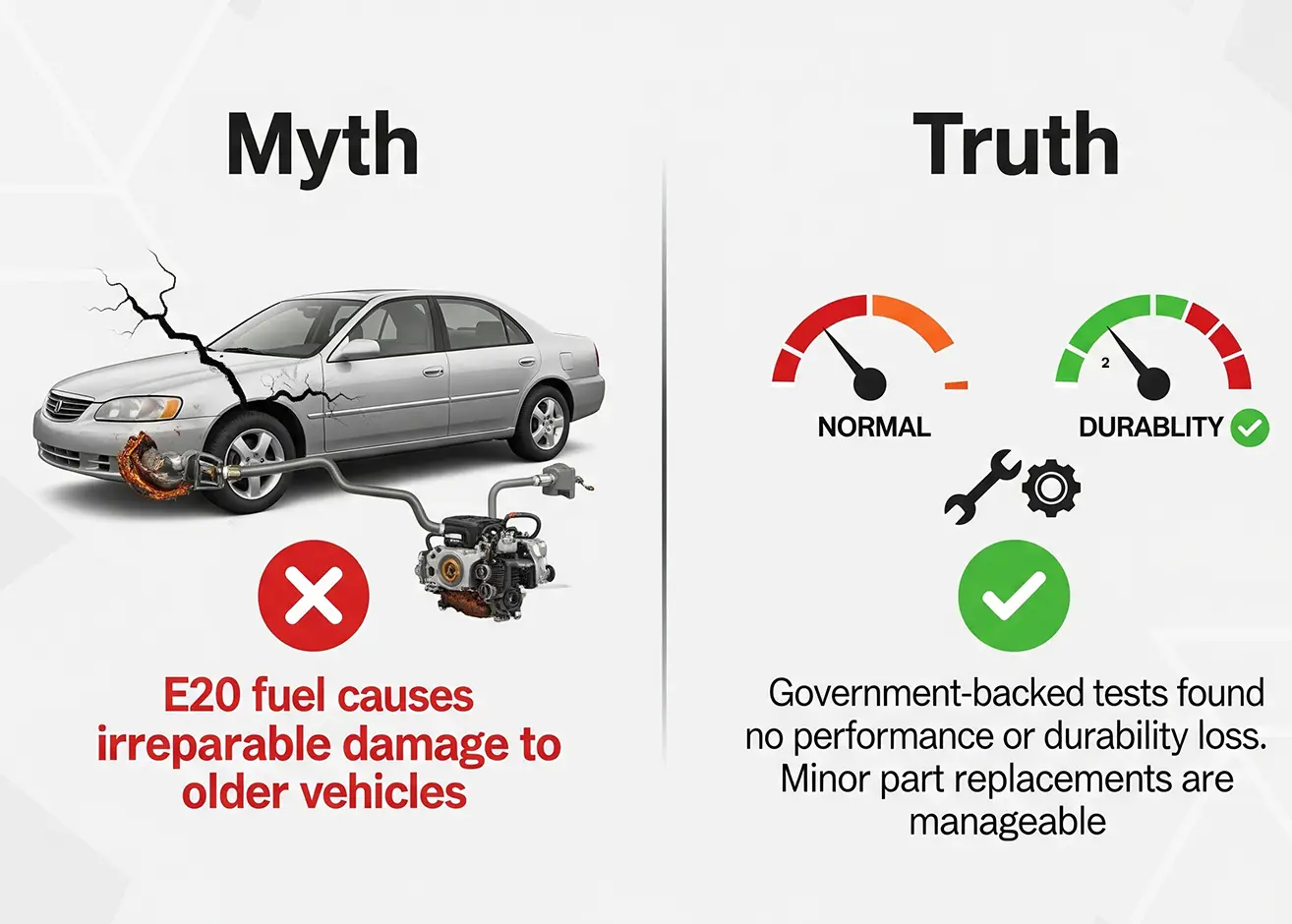
The Reality: Thoroughly tested, ethanol does not lead to performance/durability issues
Several countries have been adopting ethanol blended petrol from as early as the 1990s, with India’s own Ethanol Blended Petrol Programme in place since 2003. With both global and national precedents, over the years, several government-backed tests and research have been conducted by organisations like ARAI, IIP, and Indian Oil R&D, which have confirmed that there are no performance or durability issues in vehicles running on E20 petrol.
International studies on ethanol blending, through in-depth testing of fuel-injected vehicles at intervals of every 10,000 km till their first 1,00,000 km, also showed no significant ill effects in power and torque generation. And if you are still unsure, make sure to check your car's engine compatibility for E20 petrol.
Moreover, the requisite safety standards for E20 petrol are well established via BIS as well as industry standards. For a majority of parameters, such as metal compatibility, plastic compatibility, drivability and startability, there are no major issues. Only in cases of certain older vehicles, gaskets and rubber parts may require replacement earlier than in the case of non-blended fuel usage. However, this replacement is inexpensive in nature and can be done during regular service.
Myth: E20 petrol drastically reduces fuel mileage
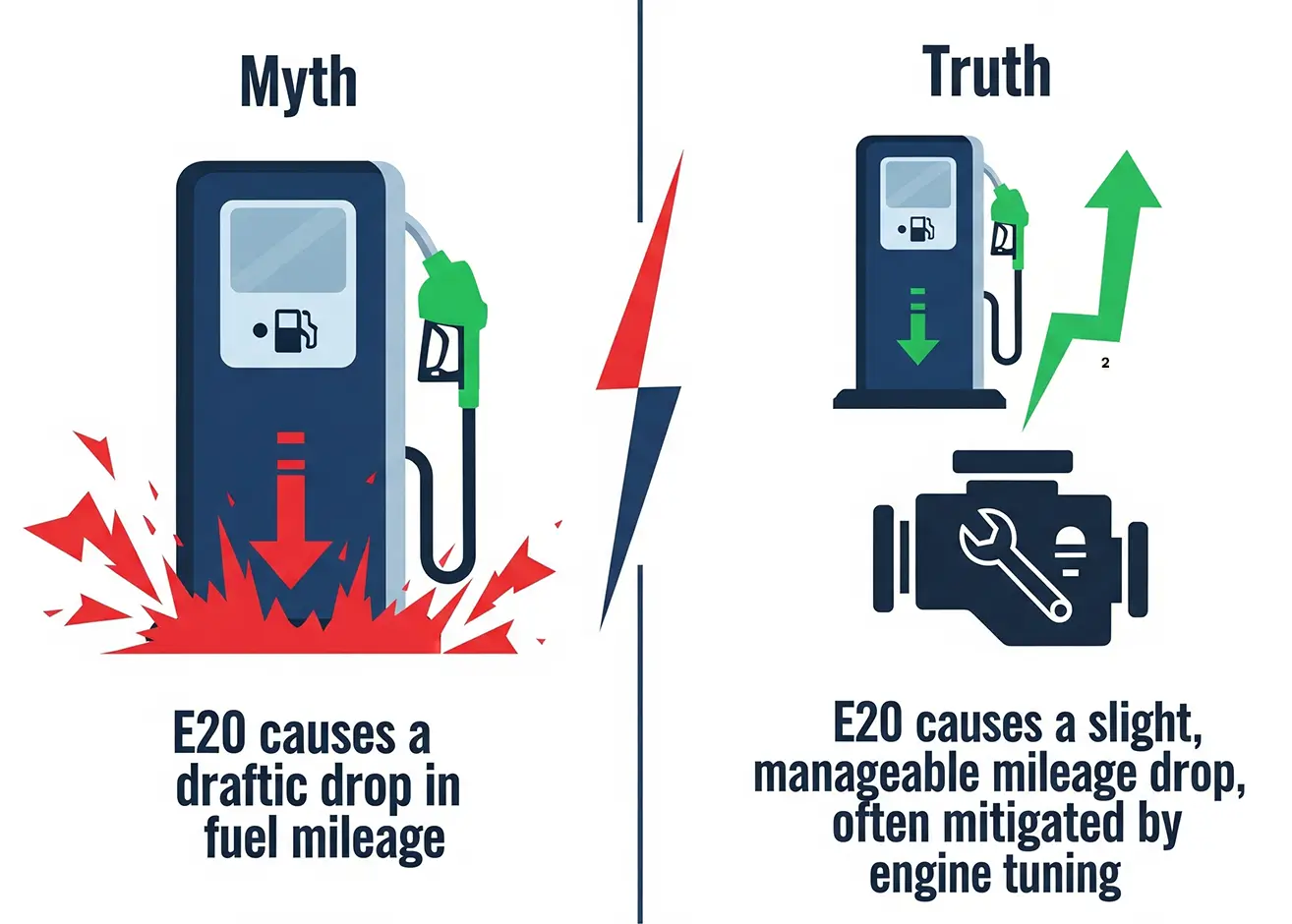
The Reality: Ethanol leads only to a small drop in mileage, which can be minimised with engine tuning
While efficiency reduction with E20 petrol is somewhat true, the magnitude of this variation is often misplaced and exaggerated. While using E20 petrol, a slight mileage drop: ~1–2% for E10-calibrated engines running on E20 fuel and ~3–6% for other older engines might occur.
However, an important thing to note here is that BS6 Phase 2 cars manufactured post April 2023 are already fully E20-compliant and do not show any noticeable mileage reduction. Moreover, even for vehicles that show a minute mileage reduction, the overall difference is not very significant and can easily be mitigated by proper engine tuning. The overall mileage you get from your car depends on a variety of factors such as vehicle maintenance, driving habits, tyre pressure and alignment and even air conditioning load.
Myth: E20 petrol causes corrosion in fuel systems
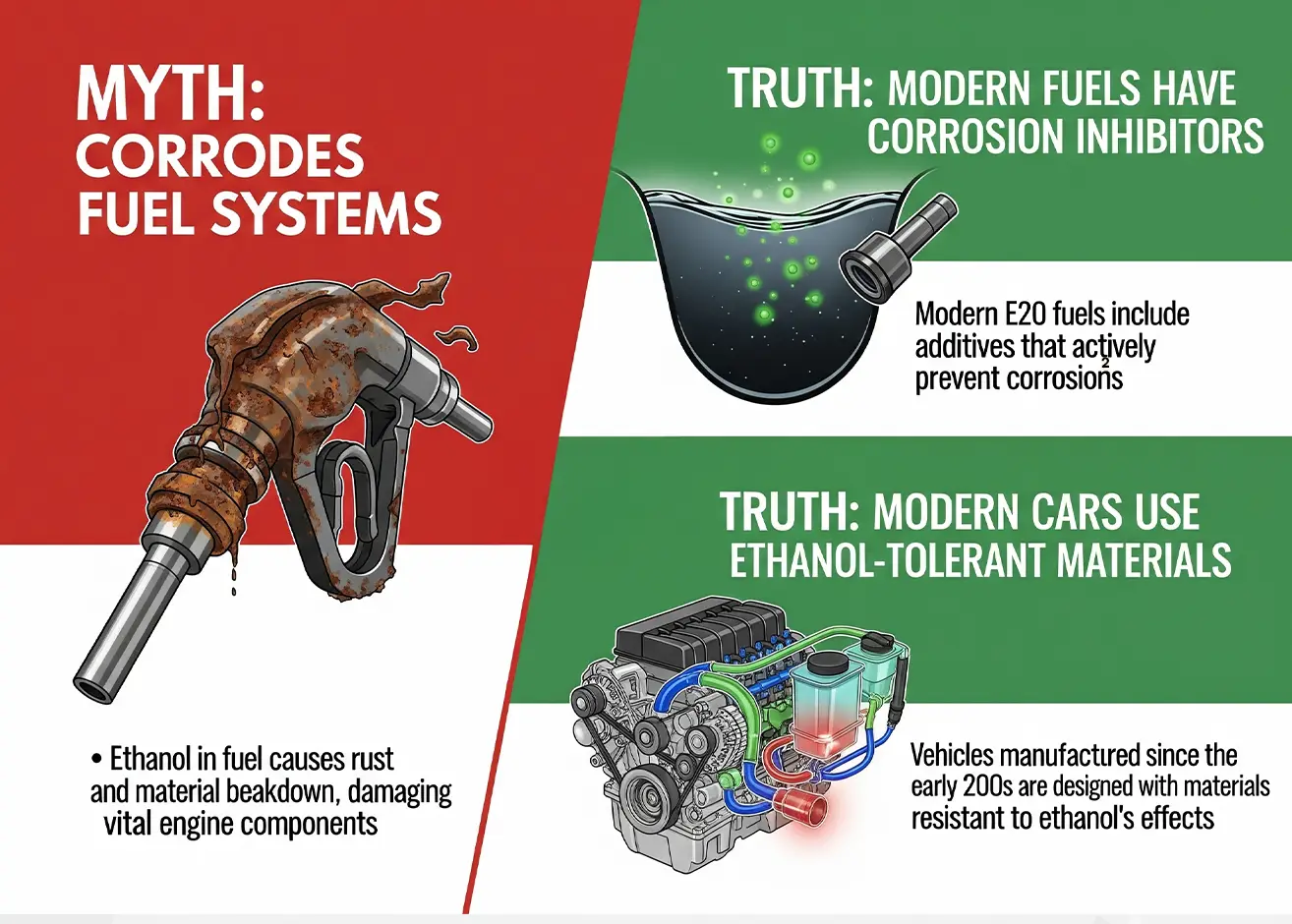
The Reality: Modern ethanol blended fuels have corrosion inhibitors to mitigate corrosion
Even though ethanol blended petrol is considered to be chemically more corrosive than regular petrol, its overall effect on the engine system is not as harsh as portrayed. Moreover, since modern fuels include corrosion inhibitors, the chances of your car’s engine being damaged only because of E20 petrol use are minor.
BIS and OEM standards ensure the use of ethanol-tolerant materials in fuel lines, tanks, and injectors, especially for newer vehicles. For older cars, the risk might definitely be higher, but is it high enough to make E20 petrol a complete no? Well, that is something that needs a bit more testing.
Myth: Consumers are forced to use adulterated petrol
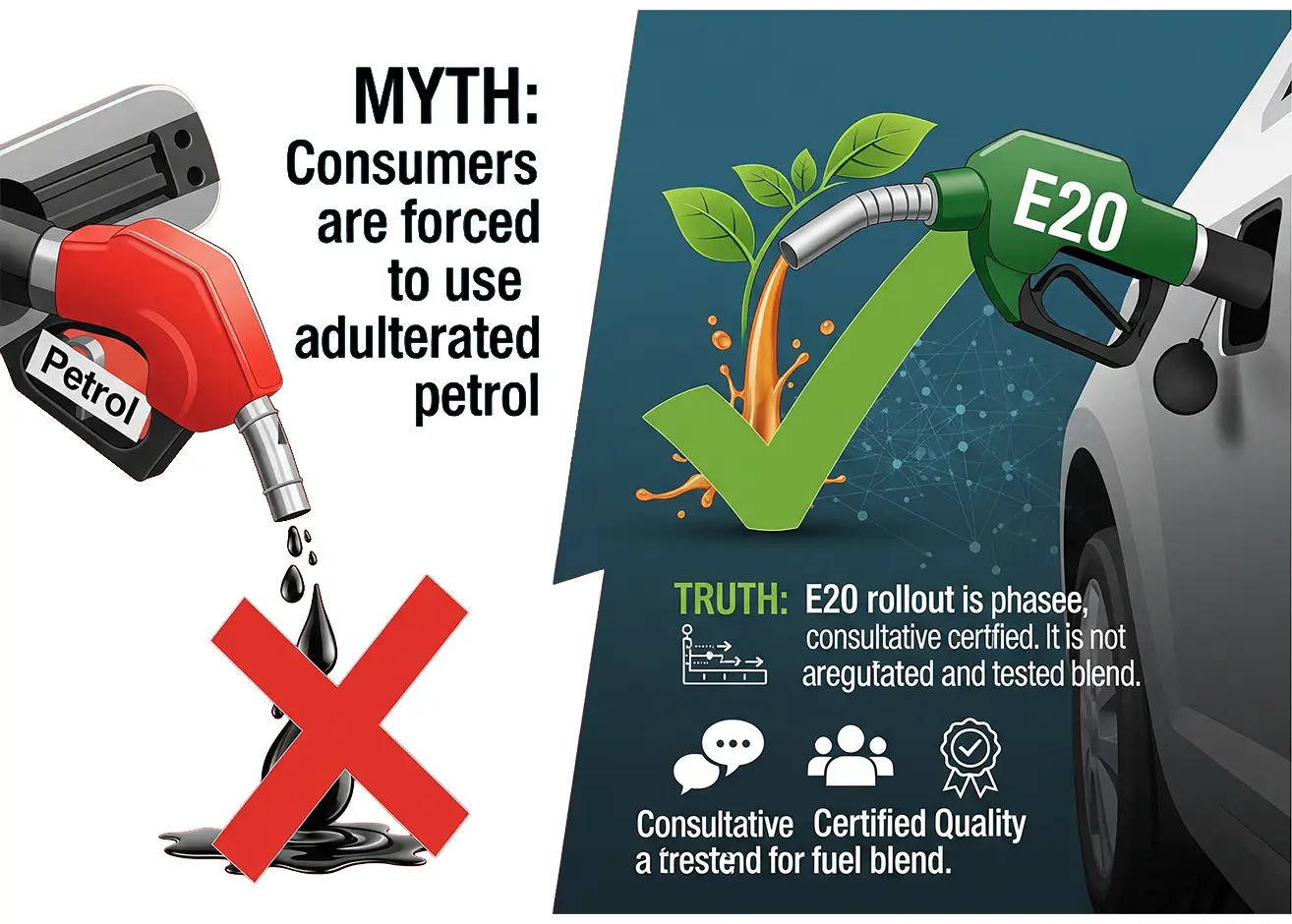
The Reality: E20 is a certified, phased, and regulated fuel, not adulteration
Labelling E20 petrol as “adulterated” is completely flawed and unwarranted. The term adulteration implies blending fuel with something that reduces its quality and properties. However, with ethanol, the equation is completely different. The process of ethanol blending is a highly researched and globally tested process that makes petrol burn better in a cleaner manner and with fewer CO2 emissions.
Myth: Ethanol leads to food shortages
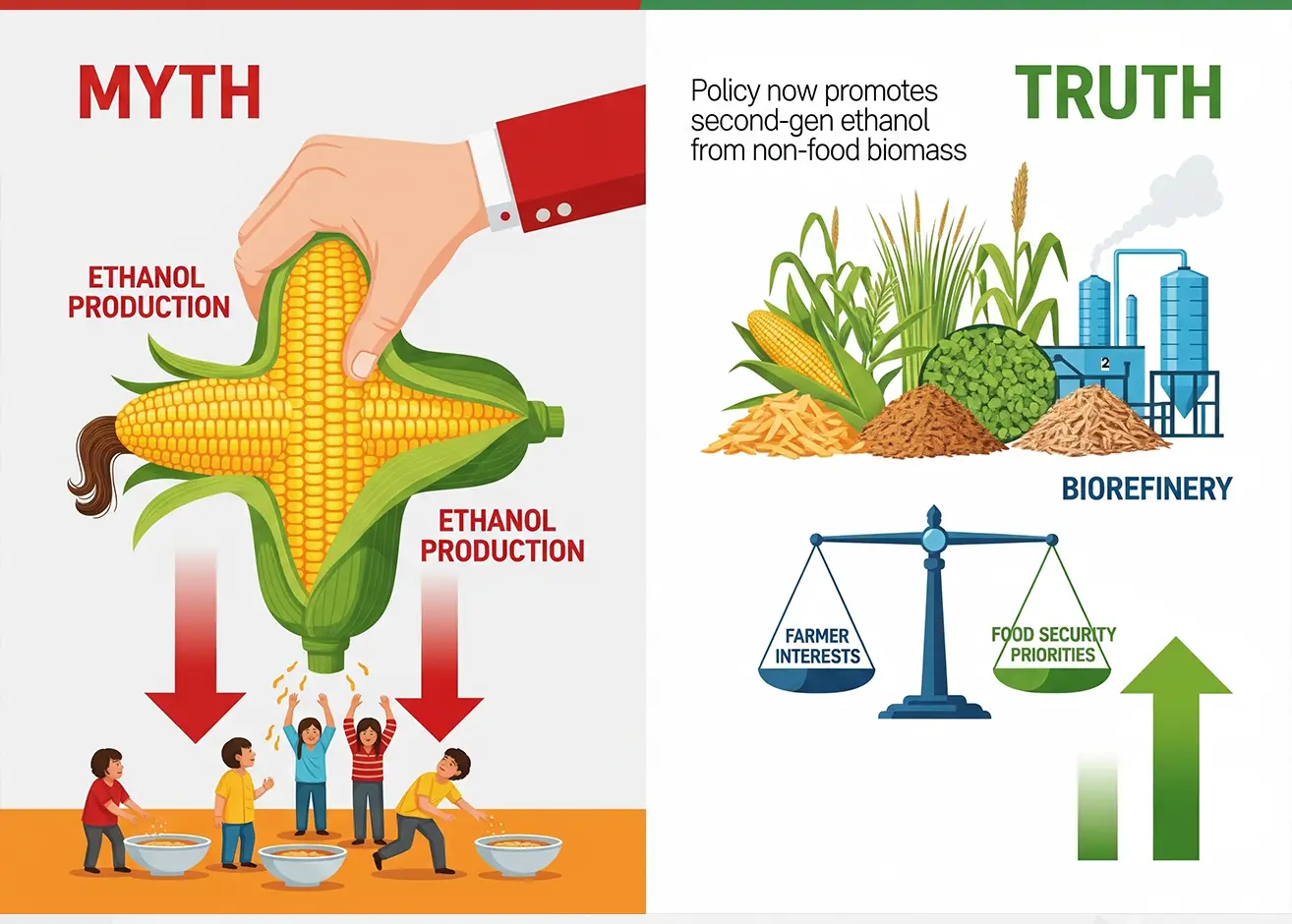
The Reality: Ethanol policy focuses on non-food biomass, ensuring food security is maintained
While it is true that the production of ethanol largely depends on the processing of natural biomass such as sugarcane, molasses, grains, etc., the process of ethanol production in India is undertaken in a manner that ensures that the nation’s food security is not hampered in any manner. Moreover, the Ethanol Blended Petrol Programme in India is a progressive policy that promotes second-generation ethanol production from non-food biomass.
Myth: Ethanol leads to lower lubrication and more engine wear
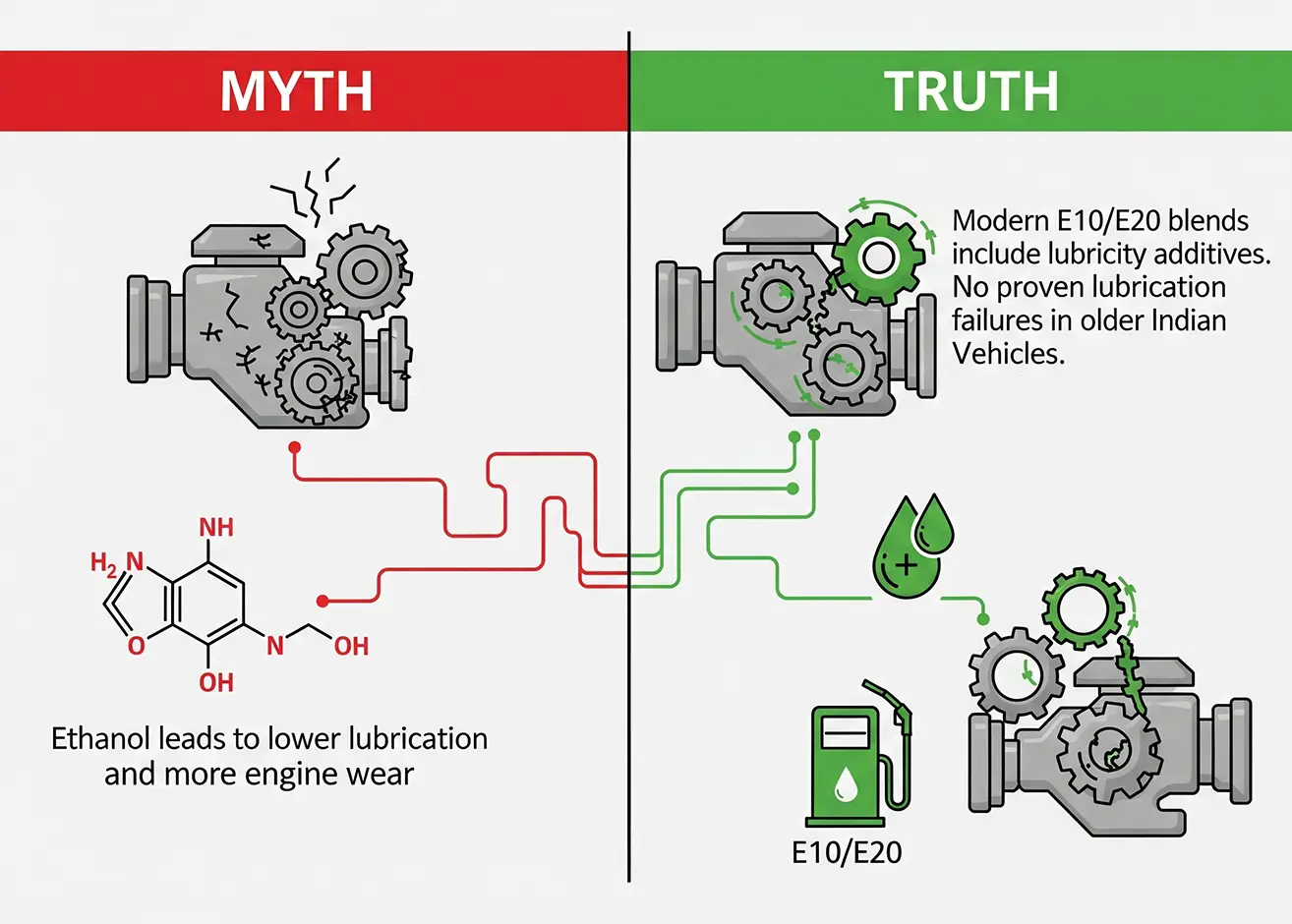
The Reality: E10/E20 blends use lubrication additives to prevent engine wear
Modern E10/E20 ethanol -petrol blends contain lubrication additives that ensure the engine is not subjected to excessive wear and tear. There have been no proven lubrication-related failures in older Indian vehicles using E20 petrol. In fact, age-based wear, not ethanol, is the usual cause of ultimate engine failures.
Myth: Ethanol increases knocking in pre-2017 cars
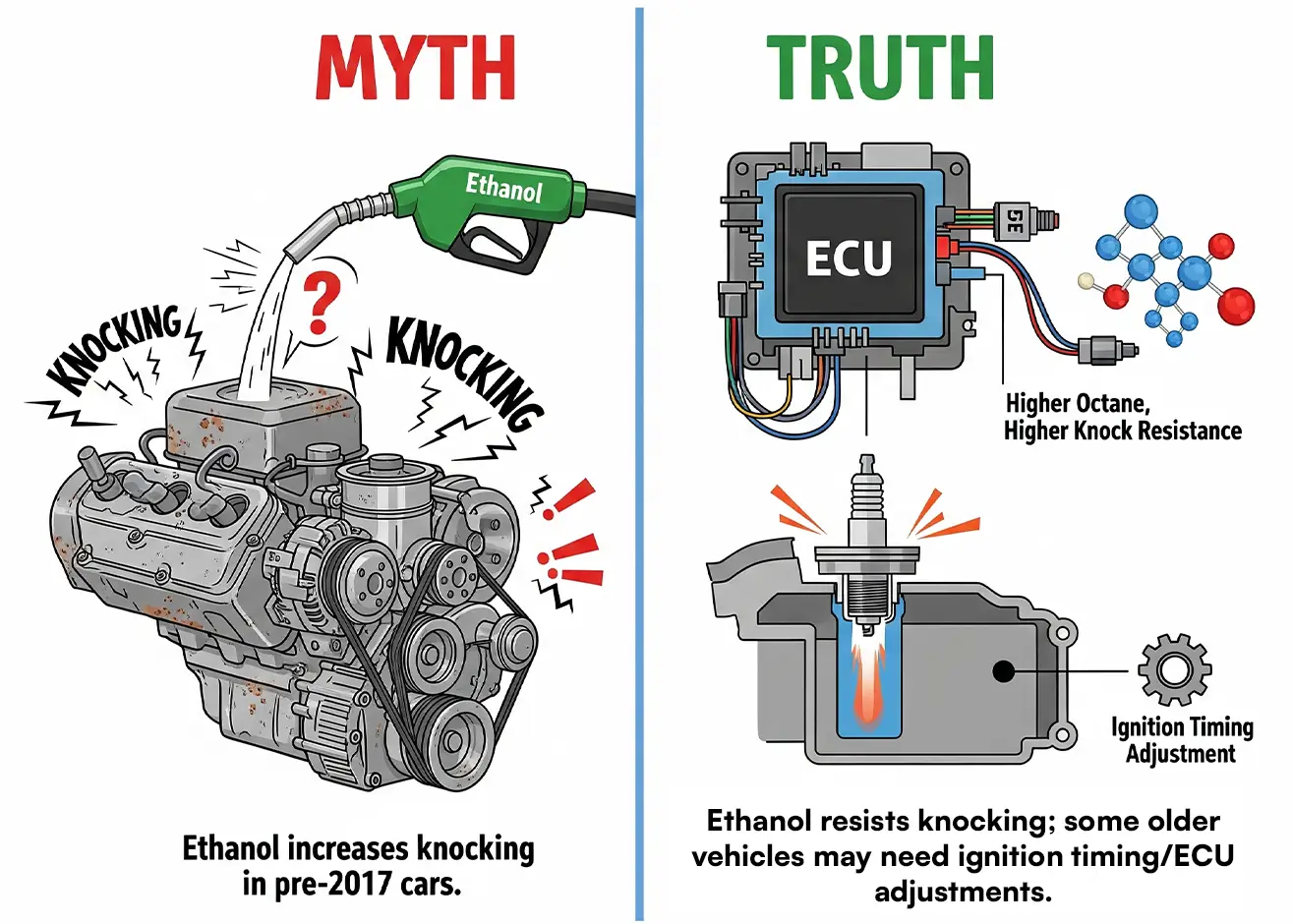
The Reality: Ethanol may lead to engine knocking, which can be tackled through ECU adjustments
While it is true that ethanol itself has a higher knock resistance, however, that does not pose a problem in any manner provided the ECU is rightly calibrated. Some pre-2017 vehicles may lack adaptive ECUs and might require an ignition timing adjustment, but that again is something that can be managed with ECU calibration.
Moreover, since E20 petrol has a Research Octane Number (RON) of 95, the blend itself has better anti-knocking properties and performance, as per a press release published by the PIB on 12th August,2025.
Myth: The Government does not pass the cost advantage of ethanol blended petrol to consumers
The Reality: The procurement price of ethanol has increased, leading to an increase in prices
While it is true that in 2020-2021, a report of the NITI Aayog promulgated ethanol to be cheaper than petrol, however, since then, the procurement price of Ethanol has increased, resulting in the weighted average price of Ethanol being higher than the cost of refined Petrol. The price of C-heavy molasses-based Ethanol has increased from Rs.46.66 (2021-22) to Rs.57.97 (2024-25). The price of maize-based Ethanol has also increased from Rs.52.92 to Rs.71.86 over the same period.
**Data as per press release published by PIB on 12th August, 2025.
Myth: E20 is a scam to boost the government fuel tax
The Reality: Ethanol is subject to tax incentives
If you happen to visit a petrol pump selling E20 petrol recently, you would notice that ethanol-blended fuel is priced lower than regular petrol. Moreover, in 2021, the government also lowered the GST rate from 18% to 5% on ethanol meant to be used for blending purposes. Moreover, in 2022, the Central Board of Indirect Taxes & Customs also exempted the excise duty on higher biofuel blends.
The Bottom Line
The adoption of E20 fuel in India has truly triggered a new chapter in the history of India’s Ethanol Blended Petrol Programme that started in 2003. With several environmental and sustainability benefits, ethanol blended petrol is a big move that can truly elevate India’s energy security. However, the only way that can happen is when we, as consumers, truly gain knowledge about ethanol blended petrol amidst all the myths surrounding it.
Frequently Asked Questions
Expand all





























